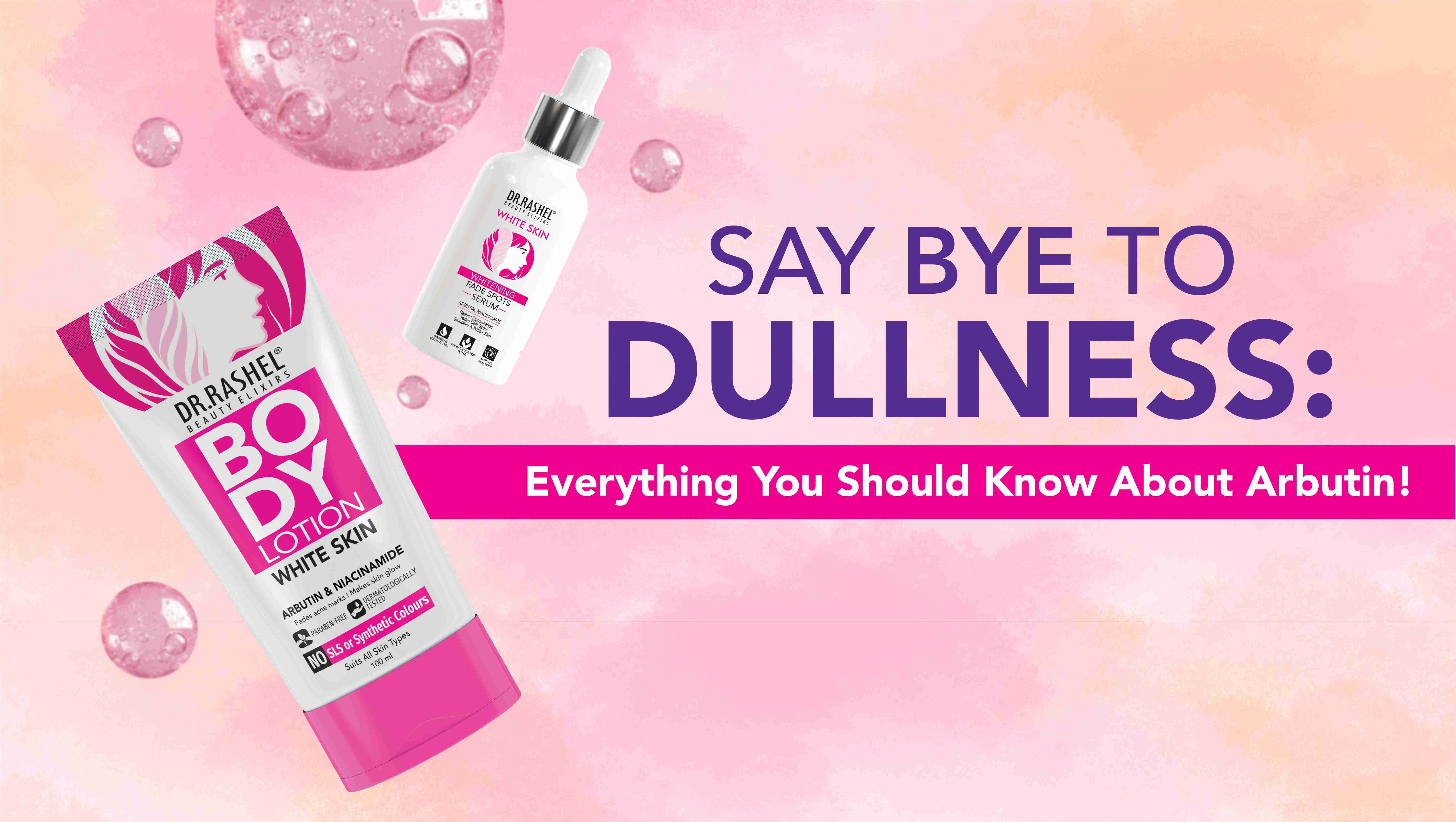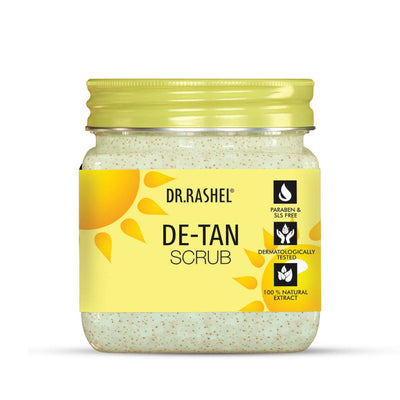
Table of Contents
- Understanding Arbutin: The Glow-inducing Ingredient
- Where does arbutin come from?
- What are the benefits of Arbutin for skin?
- What are the negative effects of Arbutin?
- How does arbutin work on skin?
- Who needs Arbutin?
- Conclusion
- FAQs
That snatched sun-kissed photo is such a trend! But standing under the sun getting tanned is not so ideal. Sunscreens do the work of protecting but what about brightening up your skin? Say hello to Arbutin!
Arbutin is your solution to get rid of dark spots, acne scars and uneven skin tone while being skin-friendly. This molecule is a go-to for anyone who wants radiant complexion. Now that we have your attention, let’s learn what arbutin is, its positives and negatives and why your skincare routine needs it!
Understanding Arbutin: The Glow-inducing Ingredient
Arbutin is a magical lil’ molecule that helps brighten dark areas on your skin and fade the appearance of scars. Arbutin suppresses the production of melanin that is a major contributor of hyperpigmentation and uneven skin tone.
Arbutin has three core derivatives: Alpha-arbutin, Beta-arbutin and Deoxyarbutin
Alpha-arbutin and Deoxyarbutin are the artificial forms of arbutin while Beta-arbutin is the natural one derived directly from the plant!
Word on the internet is that, Alpha-arbutin is more stable and stronger than beta-arbutin and thus you see Alpha-arbutin in most skincare products.
Where does arbutin come from?
Arbutin is naturally secured from the bearberry, cranberry and mulberry plants. And when lab-made, Alpha arbutin is the safer and milder derivative of hydroquinone, another skin-brightening substance. Arbutin helps reduce age and sun spots, acne marks, hyperpigmentation and other blemishes.
What are the benefits of Arbutin for skin?
Here are the key alpha arbutin benefits for your skin:
Says bye to dark spots
Arbutin benefits the skin by blocking the activity of tyrosinase, the enzyme that is responsible for melanin production in your skin. This translates to lesser pigmentation, dark spots and a more even complexion.
Is hella gentle
Arbutin has a whole different vibe compared to other skin-lightening ingredients. It is known to be a “soft boy” because of its gentle action on the skin. It does its job without causing skin irritation making it ideal for sensitive skin.
Gives skin that glow
Arbutin for skin brings down the appearance of sun stamps and pigmentation problems and makes your skin complexion look healthier and more vibrant over time. With Arbutin your face will be giving glazed donut vibes—smooth and shiny!
What are the negative effects of Arbutin?
Arbutin is a no drama ingredient that suits most skin types but there are rare cases where it can cause a skin reaction. The few alpha arbutin side effects are:
- Skin may get irritated
- Face may develop mild acne symptoms
- Skin becomes sensitive and prone to sun damage
- May become allergic
How does arbutin work on skin?
Arbutin when fed to the skin, gets soaked in the cells. Here Arbutin starts cosplaying as a melanin-inhibitor! It starts to hinder the tasks of tyrosinase and in turn the production of melanin.
Tyrosinase=the enzyme responsible for melanin production
Melanin=the pigment that gives your skin its color
Overproduction of melanin is the reason for your hyperpigmentation, dark spots and uneven skin tone. When you use Arbutin, it stops melanin from making a move and hence fades all your pigment-problems.
Who needs Arbutin?
These are the arbutin benefits for skin types:
Those who want poppin’ skin
Arbutin is a very needed ingredient when it comes to skin-brightening and glowing skin care routines. It works well with many other skincare actives in bringing down hyperpigmentation and dark spots.
People with delicate skin
Arbutin is a gentle and safe option for those whose skin is a drama queen. Because sensitive skin reacts negatively to most things, hydroquinone is not cut out for it. Thus Arbutin is tolerable for longer term use on sensitive skin types.
Skin going through post-acne journey
Arbutin works well for the marks that nasty pimples and breakouts leave behind. It heals and fades the dark spots and creates an even skin tone. Alpha arbutin for acne scars works in an effective way without clogging pores and aggravating acne.
Not kissed, sun-burnt skin
Too much sun exposure makes melanin come up to the skin’s defense. This is what makes your skin look discolored and hyperpigmented. Arbutin cools down melanin production and fades the effects without making skin more sensitive to the sun.
Conclusion,
Arbutin is a true glow-inducing ingredient! It is gentle yet incredibly effective. Arbutin is a perfect fit for people looking to get rid of hyperpigmentation and post-acne marks without causing any irritation to your skin.
With consistent use and not skipping sunscreen, you can get that ring light glow (without the ring light).
FAQ’s
Is alpha arbutin safe?
Yes! Alpha arbutin is safe for use as a topical skincare product. Derived from the bearberry plant, it inhibits the enzyme responsible for melanin production and is generally gentle and tolerable to most skin types.
Does alpha arbutin lighten skin?
Yes! Alpha arbutin reduces melanin production thus contributing to lightening dark spots, hyperpigmentation and uneven skin tone. It brightens your complexion without altering your natural skin tone.
Can alpha arbutin be used with retinol?
Yes, you can use Retinol with Alpha arbutin to enhance your skin tone. Retinol will help speed up cell turnover and alpha arbutin will target hyperpigmentation.
Is it OK to use alpha arbutin everyday?
Absolutely! Alpha arbutin is a gentle ingredient that can be used on the daily. Make sure to be consistent, apply it to a clean face and follow up with a moisturizer and sunscreen.
How long does it take to see results from alpha arbutin?
Results of using Alpha arbutin can be seen only after consistent use for 4 to 8 weeks. You'll start noticing that your dark spots have faded and there's a brightness to our complexion.
Does pigmentation come back after stopping alpha arbutin?
Pigmentation is caused by factors like sun exposure, hormonal changes, etc. So if these factors persist and you stop using Alpha arbutin that pigmentation may likely come back.
Written by Madiha Patel







